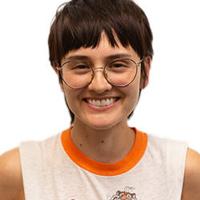Close your eyes. Imagine a college student. Who did you picture? A dewy, fresh 18-year-old? A 21-year-old getting their first alcoholic beverage in their college logo sweatshirt? If that is indeed what you pictured, why? We should stop assuming the college experience looks a certain way, because for me and others like me, it doesn’t.
I dropped out of college when many of my current classmates were still flinging noodles in their high chairs. I didn’t even withdraw properly, just stopped going. Nobody around me questioned this; nobody told me I’d be carrying those F’s around for the rest of my life or that I’d be sweating buckets trying to get academic renewal for them processed in time for my university applications. Safe to say last fall was possibly my personal record for ugly crying.
After I dropped out, I worked the most random collection of jobs you can imagine for 16 years. I worked as a birthday party princess, painting faces and making balloons. I worked at an amusement park I wouldn’t be caught dead in today. I worked in hospitality. I booked acting gigs.
I always loved reading and writing but figured higher education wasn’t built for me. I remember walking around campus with my friend, a UC Berkeley alum, during the COVID-19 pandemic. As he showed me and my partner all his old haunts and everyone’s calves burned, I stared in awe at the buildings and trees.
If you had told me back then I would be back on campus as a student a few short years later, I would have cackled. It was so far beyond my meager aspirations to ever attend UC Berkeley, let alone write for the newspaper. This school wasn’t even on my radar at all until 2015. When my mother found out I was accepted here, she sent back a text that effectively said, “That’s nice” because she didn’t really know what it was either.
This column is called “Non-Trad Undergrad” because I’m considered a nontraditional student, and I’m proud of it. I claim it, but I also know no other way to be.
I believe a cultural shift should take place in terms of the way we discuss higher education: things such as who it’s built for, which degrees are acceptable to pursue, what “college life” really means and how the word “college” has taken on an age-specific connotation. In my soul, I believe college should be discussed in a more expansive way, one that is not ageist or otherwise limited. I want to challenge these limitations we’ve lazily resigned ourselves to as a society.
My parents did not deposit me in a dorm with all my goodies in a plastic bin. My parents don’t stock the fridge with my favorite Costco snacks or know anything about my classes. There is no home base for me to return to: Berkeley is my home now, holidays will be spent here.
There’s a meme going around that shows a picture of Dame Maggie Smith that reads, “Please be patient with me, I’m from the 1900s.” And that perfectly sums up how I feel traversing the campus during the 10-minute window we call Berkeley time, amid hundreds of people whose first memory of a president is Obama. There are other nontraditional students on campus, but you have to seek them out.
People in college sweaters used to annoy me. I’d both simmer with jealousy and roll my eyes when they made huge reservations at the restaurant where I worked. College is for rich people, I thought. College is for the people I’m waiting on. And if they’re not rich, they’re smarter than me. When I challenge society’s typical notion of a college student, I’m challenging my past false beliefs too.
It’s hard to picture something you’ve never been shown, which is why I want people to know that we exist. Nontraditional students are out here hobbling around with our packed lunches and multiple tote bags, with our sense memory of T9 word and character limits on text messages, with our spouses or children, with our unique and complicated histories.
If you’re nontraditional in any way, I’m here to tell you that you deserve to be here! No, everyone is not smarter than you. Yes, there are systems in place to help you. It’s not too late. The standard educational timeline is a construct. “College age” is any age, and I’m living proof.

